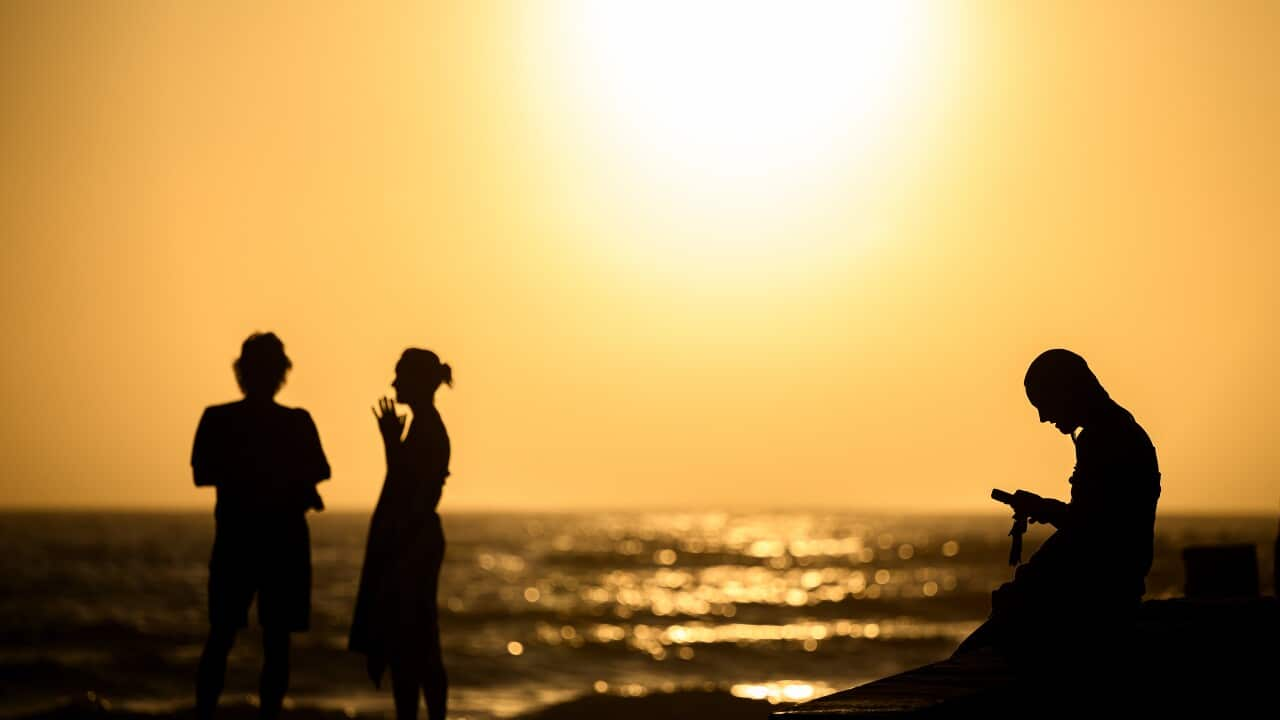Power blackouts might hit parts of NSW and Queensland this week, with western Sydney estimated to hit 40C on Tuesday and Wednesday.
The severe heatwave will bring in the hottest spring weather recorded in four years.
The heatwave is expected to sweep across Sydney, the Hunter and Illawarra regions. The central coast, mid-north coast and the south coast are also expected to be affected.
How hot will it get and how long will it last?
The spring heatwave will see temperatures surge towards 40C across Sydney.
Parts of western Sydney, including Penrith and Richmond, are tipped to hit 40C on Wednesday.
Sydney's east will experience a low-intensity heatwave with minimums of 20C and maximums above 30C.
The hottest will be on Wednesday when it's expected to reach 33 degrees.
Gosford on the central coast will hit 31C on Tuesday and 34C on Wednesday, while Nowra on NSW's south coast will be even hotter, reaching 34C on Tuesday and 35C on Wednesday.
The forecasts are above the spring average, with Richmond a huge 12C above its average November maximum of 27C and Sydney 7C above the monthly average of 24C.
Temperatures are expected to ease on Friday, with Sydney set to be soaked with rain for the remainder of the week.
Why might there be blackouts?
Increased air-conditioning use and generator repairs at three NSW coal-fired power plants threaten to shut down the grid in some areas.
"High temperatures and strong electricity demand, combined with some generation outages, are causing tight electricity supply forecasts in NSW tomorrow and Wednesday afternoon," a spokesperson for the Australian Energy Market Operator (AEMO) said.
Planned outages at a number of these coal plants have been avoided after the operator issued a warning that low energy reserves could see huge parts of NSW and Queensland hit with blackouts.
The combination of increased air-conditioning use with generator repairs at three NSW coal-fired power plants raised concerns about potential grid outages in some areas. But AEMO confirmed late on Monday that the worst has been averted.
"AEMO remains focused on maintaining electricity reliability in both New South Wales and Queensland this week, as high temperatures are expected to drive strong energy demand amid significant generation unavailability in NSW," a statement read.
But there are still concerns that power outages could occur.
The energy operator issued an alert for a forecasted lack of reserve (LOR) in the two states for Tuesday until Wednesday afternoon, with NSW copping the highest tier of risk, a LOR 3 forecast.
This was later downgraded to a less critical LOR 2.
Blackouts are most likely to occur between 3.30pm and 7.30pm, with people urged to limit their power use if it's safe to do so.
NSW Energy Minister Penny Sharpe urged residents to rethink their power usage.
"Do you really need to have every single light on in the house ... do you need to have your air conditioning down at 19 degrees? You don't," she said.
Here's how you can stay safe during a heatwave
People have been cautioned to stay safe during the severe heatwave, which can be particularly dangerous for many people, including pregnant people, babies, older people, and those with medical conditions.
"You should drink water, you should check in on neighbours, and you should think about whether you need to walk out in the middle of the day in the beating hot sun," Sharpe said.
Residents have also been encouraged to rethink their energy and air conditioning usage during the period to alleviate pressure on the system, but only if it's safe for them to do so.
Here are some tips for coping with a heatwave:
- Use air conditioning or a fan.
- Opt for light, loose-fitting clothing.
- Keep your skin wet using a spray bottle or damp sponge.
- Take cool showers or foot baths in cool tap water.
- Wrap ice cubes in a damp towel and drape them around your neck.
- Consider spending time in cool places like air-conditioned malls or libraries.
- Avoid vigorous physical activity.
With additional reporting from AAP.










